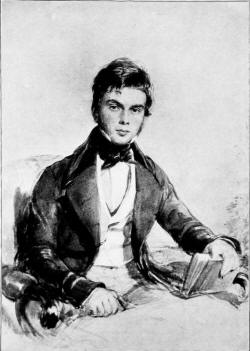

Queer Places:
University of Cambridge, 4 Mill Ln, Cambridge CB2 1RZ, UK
 William Dougal Christie (5 January 1816 – 27 July 1874) was a British diplomat, politician and man of letters.
He was part of the Cambridge
Apostles. He married Mary Grant, a neighbour and friend of Anthony Trollope,[19] and the eldest daughter of Colonel (later Major-General) James Grant, CB.[20] They had at least 3 sons and 3 daughters, including the novelist Mary Elizabeth Christie (1847–1906).[21]
William Dougal Christie (5 January 1816 – 27 July 1874) was a British diplomat, politician and man of letters.
He was part of the Cambridge
Apostles. He married Mary Grant, a neighbour and friend of Anthony Trollope,[19] and the eldest daughter of Colonel (later Major-General) James Grant, CB.[20] They had at least 3 sons and 3 daughters, including the novelist Mary Elizabeth Christie (1847–1906).[21]
The son of Dougal Christie, M.D., an officer in the East India Company's medical service, he was born at Bombay on 5 January 1816. He graduated at Trinity College, Cambridge, in 1838,[1] where he was one of the Cambridge Apostles,[2] and was called to the bar in 1840.[3] At this time he was editor of a newspaper, the Kentish Mercury, Gravesend Journal, and Greenwich Gazette, and employed the Chartist Thomas Cooper to edit it.[4] He was also introduced to Thomas Carlyle, perhaps by Albany Fonblanque, and assisted him in the plan for the London Library.[5] In 1841, Christie was for a short time private secretary to Lord Minto at the admiralty, and from April 1842 to November 1847 represented Weymouth as Member of Parliament. In 1843 he proposed a Bill for removing the religious tests in the old universities; it was quickly defeated.[6] In 1844 he proposed a motion in order to allow presence of "strangers" (journalists) in the House of Commons and the recognition of the right of the journalists to publish reports on the Parliamentary debates. This motion was defeated. [7] In May 1848 Christie was appointed consul-general in the Mosquito Territory, and from 1851 to 1854 was secretary of legation, frequently acting as chargé d'affaires, to the Swiss Confederation.[3] In 1854, Christie was made consul-general to the Argentine Republic, and in 1856 minister plenipotentiary. In 1858, he was despatched on a special mission to Paraguay, and in 1859 became envoy extraordinary and minister plenipotentiary to Empire of Brazil. This post involved him in constant difficulties with the Brazilian government, partly arising from his efforts to enforce the treaties relating to the slave trade, and partly from claims for compensation on the part of British subjects.[3] Christie's position wasn't helped by a quarrel at cards with James Watson Webb, the American ambassador, at the Russian embassy.[2] The situation came to a head in 1863 when Christie sent an ultimatum for reparations for two minor incidents at the end of 1861 and beginning of 1862.[8] The Brazilian government refused to yield, and Christie issued orders for British warships to capture Brazilian merchant vessels as indemnity.[9] While Christie had been instructed to accept a Brazilian offer of arbitration if it was made, he was later accused of not informing the Brazilian government of this until after military action had been taken; he had indicated he wanted to teach Brazil a "lesson".[10] Brazil prepared itself for the imminent conflict.[11][12] The Brazilian government severed diplomatic ties with Britain in June[13] and Christie retired from the service on a pension.[3] The House of Commons debated his conduct, with some MPs like Seymour Vesey-FitzGerald criticising him for taking disproportionate action, to teach Brazil a "lesson".[14] Christie returned to an old topic, campaigning against electoral corruption. He read a paper on the subject to the National Association for the Promotion of Social Science in February 1864. Later in the year F. D. Maurice praised it in Macmillan's Magazine.[15] He then made two unsuccessful attempts to re-enter parliament, at Cambridge in 1865 and Greenock in 1868. After a serious illness, he died in Marylebone on 27 July 1874.[3]
My published books: